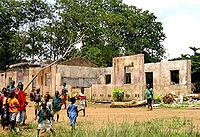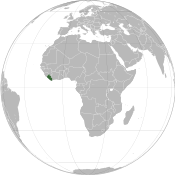Charles Taylor gets 50 years for war crimes
Wednesday, May 30, 2012
Charles Taylor, the former President of Liberia, has been today handed a 50-year sentence for war crimes in neighbouring Sierra Leone. The court previously held he financed a war which left an estimated 50,000 dead.

Image: Laura Lartigue.
Taylor, 64, is considered likely to remain incarcerated for life if the sentence stands, but his legal team has vowed to appeal. The prosecution sought an 80-year sentence. Taylor's is the first conviction of a head of state by an international tribunal since the fallout from World War Two, when the Nuremberg trials were underway.
The Special Court for Sierra Leone, which is operating from the Netherlands to avoid unrest if Taylor were tried in Africa, spent more than a year deliberating before convicting Taylor last month. Acquitted of ordering crimes or of acting in a joint enterprise to conduct them, he was nonetheless convicted of aiding and abetting the offences. There were 94 prosecution witnesses and 21 for the defence.
The allegations date to civil war in Sierra Leone, which ran from 1991 to 2002. Taylor, who had been a warlord since the '80s, backed the rebel Revolutionary United Front (RUF). Taylor was elected Liberian president in 1997 after a different civil war concluded.
Six years later he was ousted when an arrest warrant was issued and fled to Nigeria. He was arrested there in 2006 whilst again trying to flee and went on trial later that year. Taylor, who had been facing a rebellion against him since 1999 in Liberia, received training from late Libyan ruler Colonel Muammar Gaddafi's regime.
Testimony included claims that Taylor-backed fighters adorned roads with human intestines and ate human flesh. One claimed to have seen Taylor himself eat human liver, something Taylor denied. One described asking RUF rebels to sever his only hand in exchange for his young son's life.
Further allegations said teenage children were involved in the fighting and that Taylor sold illegally mined diamonds to finance arms purchases for the RUF. Western celebrities Naomi Campbell, a model, and Mia Farrow, an actress, described an incident at a charity dinner held by Nelson Mandella, then South Africa's head, in 1997. Campbell and Farrow said Taylor gifted Campbell a number of diamonds. Taylor is claimed to have ordered seizure of Sierra Leone's diamond deposits by RUF soldiers.
It was claimed in court that child soldiers were used in conflict, as diamond mine guards, and to carry out amputations. Allegations of forced amputation were made. Taylor was convicted in late April of aiding and abetting forcing amputation, as well as rape, murder, child soldier recruitment, sexual slavery, and pillaging.
The court's panel of judges, presided over by Judge Richard Lussick, heard a 30-minute address by Taylor at an earlier sentencing hearing. "I express my sadness and sympathy for crimes suffered by individuals and families in Sierra Leone," said Taylor, adding he acted "with honour" and as a peacemaker, asking for "reconciliation, not retribution" in sentencing. Taylor also gave evidence at his own trial, spending seven months of testimony saying he strove for peace in the region.
Lussick noted the panel felt 80 years to be excessive given that Taylor was cleared of directly carrying out offences. However, the court found other factors aggravated the case: In particular, he was a head of state. "Leadership must be carried out by example by the prosecution of crimes, not the commission of crimes," Lussick said in court. "The special status of Mr. Taylor as a head of state puts him in a different category of offenders for the purpose of sentencing," the judge said, with the convict "in a class of his own".
"[His] positions both as president of Liberia and within the west African regional bodies distinguish him from any other individual that has appeared before this court," Prosecutor Brenda Hollis said at a sentencing hearing. "Taylor's abuse of his authority and influence is especially egregious given that west African leaders repeatedly entrusted him with a role to facilitate peace." She had claimed "No significant mitigating circumstances exist in this case."
Lussick also told the court today Taylor stood convicted of "aiding and abetting, as well as planning, some of the most heinous and brutal crimes recorded in human history". "The lives of many more innocent civilians in Sierra Leone were lost or destroyed as a direct result of his actions." These were, the court said, crimes of the "utmost gravity in terms of scale and brutality". The prosecution had claimed Taylor followed no more motivation beyond simple greed and power lust. Lussick said today the judges were unanimous in imposing a term of 50 years.
The defence had called for a sentence that gave Taylor a realistic prospect of eventual release. They also noted he is set to be sent to the United Kingdom to serve sentence. The defendant would be "culturally isolated", facing a "punishment within a punishment". At least one war crimes convict has been attacked in prison in the UK, and it is anticipated Taylor will end up in a high-security prison after the UK Foreign Office has promised to uphold an agreement to imprison him there made by ex-Foreign Secretary Margaret Beckett.
"The sentence is clearly excessive, clearly disproportionate to his circumstances, his age and his health and does not take into account the fact that he stepped down from office voluntarily," said counsel for the accused Morris Anya. The prosecution may also appeal the sentencing, and the verdict itself with intent to increase Taylor's convictions beyond merely aiding and abetting. The defence also intends to appeal the verdict.
The appeals process means Taylor is likely to remain at The Hague for several months, where the court has been holding sessions in nearby Leidschendam. He is the last defendant to face trial before the Special Court, which has previously convicted and sentenced eight other prominent figures in the conflict.
Related news
- "Liberian ex-President Charles Taylor convicted in war crimes trial" — Wikinews, April 26, 2012
Sources
- Marlise Simons and J. David Goodman. "Judge Gives Taylor 50 Years for ‘Heinous’ Crimes in War" — The New York Times, May 30, 2012
- "Charles Taylor jailed for 50 years" — Press Association, May 30, 2012
- Owen Bowcott. "Charles Taylor to be sentenced for war crimes" — The Guardian, May 30, 2012
- David Blair. "War crimes court hands Liberia's Charles Taylor 50-year jail term" — The Daily Telegraph, May 30, 2012
- May 30, 2012
- Published
- Archived
- Liberia
- Sierra Leone
- Africa
- Crime and law
- Politics and conflicts
- Charles Taylor
- Human rights
- War crimes
- Sex crimes
- United Kingdom
- Netherlands
- Margaret Beckett
- The Hague
- Nigeria
- Special Court for Sierra Leone
- Sierra Leone Civil War
- Human trafficking
- World War II
- Foreign and Commonwealth Office



